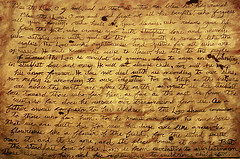In Which I Take The “Wrong Vehicle” Out For Another Spin
A week and a half ago, Mike Duran provided a thought-provoking guest post. His contention that fiction is the wrong vehicle for theology generated a wonderful discussion, which I spent way too much of my writing time following. Rebecca LuElla Miller posted a rebuttal a few days later. But I didn’t enter into either conversation because I needed time to craft a careful response.
Which I’ll attempt today.
As Rebecca suggested, the issue might have been muddied, in part, by confusion over definitions. Christian fiction is a marketing label with no substantive use beyond determining a book’s target demographic. Terms like theology and body of doctrine, like beauty, seem to be in the eye of the beholder. So I’ll avoid the fuzzily defined and keep my feet on a solid, common ground.
When God used mortal men to record His supernaturally-breathed word, He chose a variety of personalities. Let’s start with Moses, a man of unrivaled humility (Numbers 12:3) who came to be the revered father of three major world religions.
The multi-faceted David wrote transcendent poetry with one hand and wielded a bloody sword with the other. A renowned leader of his nation, he could only watch, apparently helpless, as his family fell to pieces around him. He may have engaged in automatic writing (1 Chronicles 28:12, 19).
Ezra had the mind of a pragmatic lawyer. Nehemiah was a contentious, wild-eyed zealot (Nehemiah chapter 13, particularly v. 25). Solomon’s legendary wisdom was exceeded only by his monumental foolishness.
Jeremiah tended to cry a lot.
When he wasn’t hallucinating by the river Chebar, Ezekiel was a performance artist (Ezekiel 4 & 5). As a  teenager, Daniel was kidnapped and taken to a hostile country, but never lost his cool until confronted by visions.
teenager, Daniel was kidnapped and taken to a hostile country, but never lost his cool until confronted by visions.
Amos was a simple country boy with no religious education. Micah, by some accounts, was a punster (Micah 1:10-16).
Luke, a Gentile doctor turned journalist, covered the Jewish Messiah’s shanghaiing of world events.
Peter was a brash fisherman who had to learn everything the hard way.
You get the picture: different personalities delivered God’s message in a variety of ways to various audiences—but the message was the same.
Did Ezekiel tell Jeremiah to man up? (“Dude. I didn’t even cry when my wife died!”) Did Isaiah lecture Hosea about his choice of marriage partner? (“No way, man. God would never tell you to hook up with a prostitute.”) Did Hosea suggest Amos quit being cutesy? Did Ezra take Nehemiah aside and advise him to lighten up?
If so, their discussions weren’t recorded in the Scriptures. Human nature being what it is, though, I expect all these guys caught flak for doing what they did. For being the people God created them to be. Which is probably one reason Romans 14:4 warns us against judging another’s servant.
We Christians aren’t writing scripture these days. Now, we have a different task: to be a city on a hill, a light of hope in a dark, scarey world. We’re lamps fashioned by God’s own nail-scarred hand. We’re made of everyday clay (2 Corinthians 4:6-7) so people will be drawn to the light, not to the receptacle. But not every lamp has the same design. They don’t all sit in one window or broadcast light in the same manner.
Again paraphrasing Paul, one person plants and another waters, but the fruit-production is up to God (1 Corinthians 3:7-8).
 Seems to me the question is not whether fiction is the proper vehicle for theology. (Can’t God use any vehicle?) More pertinent, I think, is whether I’m a vessel fit for His use, filled with oil, wick trimmed, chimney clean, and ready to shine His light wherever, whenever, however, and toward whomever He wants to send it.
Seems to me the question is not whether fiction is the proper vehicle for theology. (Can’t God use any vehicle?) More pertinent, I think, is whether I’m a vessel fit for His use, filled with oil, wick trimmed, chimney clean, and ready to shine His light wherever, whenever, however, and toward whomever He wants to send it.
I’m not saying we can blithely sit at our computers and plink out whatever kind of drivel makes us grin. This is a labor, and we must approach it with diligence, sweat, and prayer. But if our primary focus is our relationship with our Lord and our fitness for His use, I’m pretty sure He’ll point us in the direction He wants us to go.







































Yvonne, I believe it’s worth pursuing — especially since Mike himself admitted on his own site that he’s not after no theology, but better theology, in Christians’ stories.
In that case, in one sense fiction is a vehicle for theology —
No, strike that. Rather, solid Scriptural theology is the vehicle for great fiction.
That’s a breakthrough! For fiction, story should not be the vehicle for anything else, because story is the substance. (After all, it’s been said that the medium and the message are ultimately one and the same.) However, a worldview shaped by good theology provides a great vehicle for the telling of epic stories that ignite peoples’ hearts with the awe of God.
I believe it’s worth pursuing too, Stephen. Otherwise, I wouldn’t be doing it!
With so many kinds of people in the world, each with different needs, tastes, and experiences, it doesn’t make sense to limit the means by which we proclaim the message. And I agree that a foundation of truth makes the difference between a good story and a great one.
[…] The first part of the week was largely devoted to composing my biweekly Speculative Faith blog post, which for some reason was difficult to write as well as find appropriate images to illustrate. […]